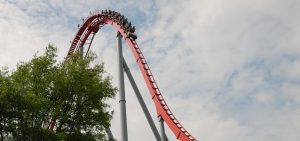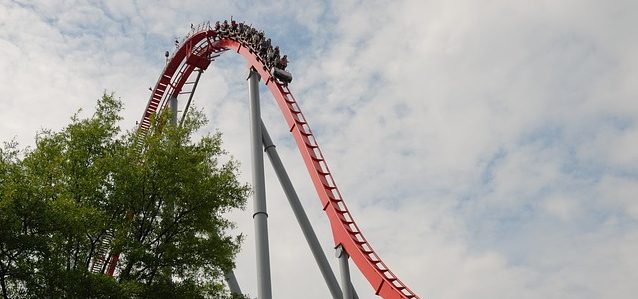
The second book of the Torah, Shemot begins with the Jewish people at a high level of accomplishment and integration within Egyptian society. But from this lofty perch of security and success in Egyptian society they are soon toppled. The situation changes dramatically for them and they go from being accepted and even respected to the position of abject and cruel slavery. And this slavery situation is not temporary, for it will last for centuries. Eventually the Jewish people, though not certainly all of the Jews, or even a majority of them, are freed from Egyptian bondage by Divine intervention and are forged into a “kingdom of priests and a holy nation.”
This wild roller coaster ride from dizzying heights to terrible lows and then the climb up again, is a startling example of God’s plan, so to speak, for Israel throughout all of its ages and climes. The Jewish world is seldom on an even keel. It has always been a series of ups and downs for us, many times even in one lifetime and generation. The past century is undoubtedly an excellent example of this pattern in Jewish history. Fortunate is the person who lives in the up times. But even that person has no guarantee that those good times are permanent and long lasting. The only thing certain in Jewish life is uncertainty. And even though we would wish for greater stability in these matters, we have to accept this Divine mandate of change and uncertainty.
Moshe’s appearance in the parsha is another example of this roller coaster, up and down situation of Jewish life. Moshe begins life as an infant thrown into the crocodile infested waters of the Nile River. He then is miraculously delivered from that fate of certain death and is raised as a prince in the house of the Pharaoh no less. He forfeits his high position out of loyalty and compassion to his Jewish brothers. A hunted man, he escapes Egypt and comes to Midian, there to marry and become a shepherd tending the flocks of his father-in-law.
Apparently there is no natural way that he can see to reclaim his role as a prince and leader. But at the incident of the burning bush the Lord plucks him away from his sheep flocks and sends him on his giant mission to redeem and educate the Jewish people, and through them of all of humankind.
Moshe rises to the highest level of human leadership and of spiritual attainment. He becomes the measuring rod – the symbol represented by his staff – of all future Jewish leadership and spirituality. But Moshe, like Israel itself, first had to be plunged into the depths of persecution and poverty before being raised to greatness. Why the Lord does things this way is naturally an unanswerable question. Suffice it for us to realize that this is our historical pattern, both in our national and personal lives. Let us hope that we will yet witness the ultimate high and full redemption of Israel and the vindication of Moshe’s great vision.
Shabat shalom.
Rabbi Berel Wein Rabbi Berel Wein- Jewish historian, author and international lecturer offers a complete selection of CDs, audio tapes, video tapes, DVDs, and books on Jewish history at www.rabbiwein.com
Text Copyright © 2007 by Rabbi Berel Wein and Torah.org


